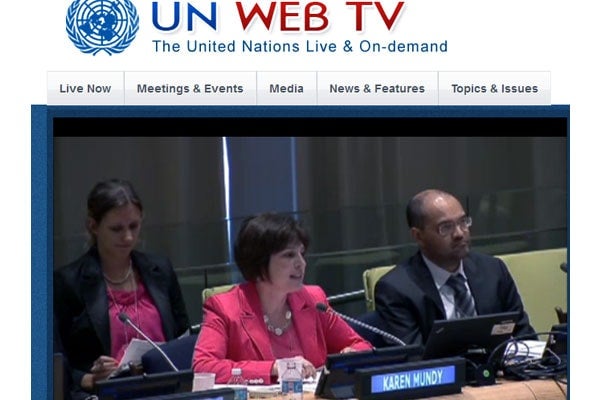
Briefing the United Nations on education
Published: June 20, 2013
For many years, Professor Karen Mundy's research has focused on the opportunity for global collective action around the right of every child to an education.
Recently, she was invited to speak about education priorities to the United Nations General Assembly Open Working Group on Sustainable Development, as the UN prepares to endorse a new set of global priorities in 2015.
U of T News asked Mundy, associate dean, Research at the Ontario Institute for Studies in Education, University of Toronto, and vice-president, Comparative and International Education Society, to describe what it was like to deliver a ten-minute briefing about education to the UN —and to field questions for more than two hours.
Can you describe your talk at the United Nations?
I wanted to establish some principles that might guide a wider set of post-2015 millennium development goals. There are five key messages that I wanted to share.
1. Let's “lean in” on education equity - and make sure our global goals recognize that education is a right. We have excellent evidence that in order for societies grow and prosper in peace, learning must be spread widely and equitably (to quote my colleague Keith Lewin). We cannot afford to leave anyone behind.
2. We need a clear target for global finance: measurable commitments that ensure no one is excluded, particularly from a full cycle of basic education – by gender, ethnicity, poverty, disability, state failure or geography.
3. Don’t drop a goal for youth and adult literacy: after all, more than 250 million school aged kids around the world are not learning to read and write even if they are in school — and this generation will be grownups soon. And there are still over 700 million adults without literacy worldwide.
4. Fewer prescriptions – and more peer learning and evidence-based intervention. This includes better monitoring of inequality within systems so we can know where to place our energies. And no “gimmicks” – let’s face it, private schools cannot close the gap in public financing, and commitment to a broad and just social compact just can’t be replaced by market -like incentives and competition.
5. And from my friend and former Deputy Minister of Education here in Ontario, Ben Levin: there are no magic bullets – to get where we want to go will require consistent, thoughtful work, using what we know, relentlessly over time.
What was the general assembly’s response?
I made a ten-minute presentation and responded to questions from country ambassadors for two-and-a-half hours and one thing that is for sure, education is a top priority for UN countries.
There seemed to be a broad commitment to an expanded set of targets moving beyond primary school access, which was the main education goal in the MDGs. People welcomed a new emphasis on learning and on skills.
And the idea of targeting global resources to ensure that there are equitable opportunities at all levels of learning was welcomed.
What was it like to speak to the international community, knowing that so many academics and decision makers were listening?
As an academic, one always hopes that your research will have an impact in the wider world. It was thrilling to add my voice and my research to the call for better global initiatives in education.



